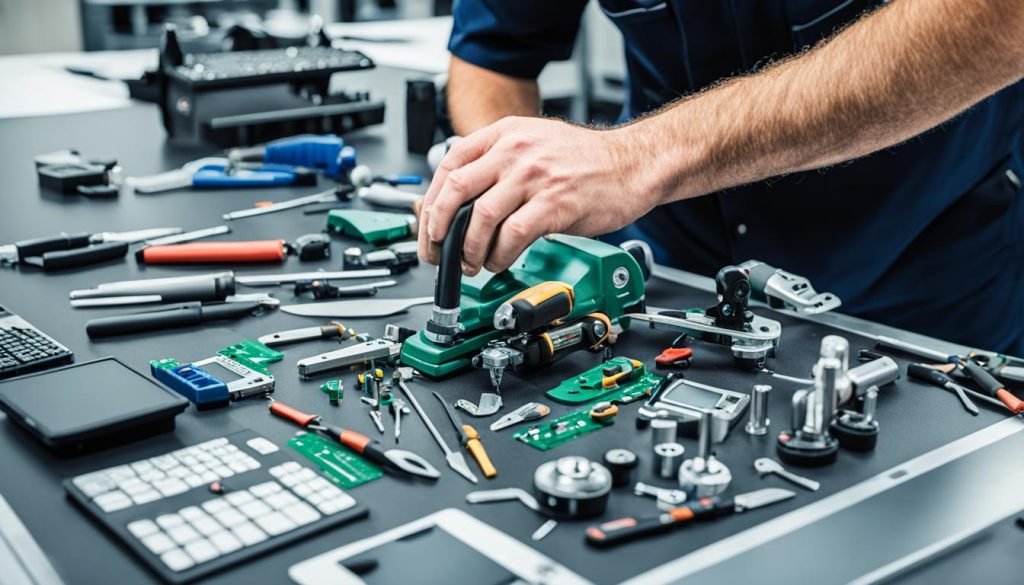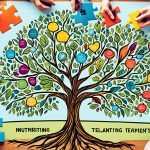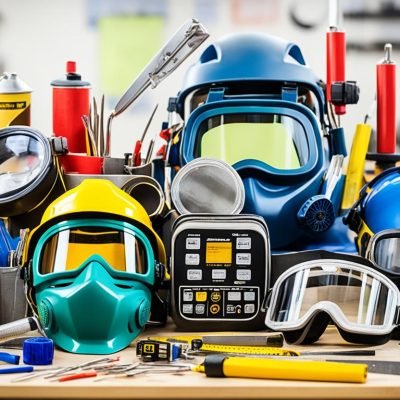In today’s job market, being ready is key to success. Job readiness training helps people get the skills, knowledge, and attitudes they need. This way, they can do well at work and in their careers. It covers getting ready for jobs, learning how to work, and getting more professional. This training makes it more likely that people will find a job they find meaningful.
Job readiness training really helps connect what you learn with what jobs need. It gives people the right tools to be better than others when they’re looking for jobs. This training also helps with making a good resume, handling job interviews, and talking well at work. It makes sure people are ready for the jobs they want.
During the training time, people get to look at many types of jobs to see what might be a good fit. They also learn important job skills, like how to talk to others, work in teams, solve problems, and manage time. These skills are super important for any job.
Learning the right technical skills is also a big part of job readiness training. You get to do real projects and get hands-on experience in your chosen field. This makes sure you’re ready for the special challenges of the job you want.
Job readiness training also shows how to act and fit in at a workplace. You learn about what’s expected of you, how to behave professionally, and how to talk at work. This helps you get along with others at work and with your bosses.
So, job readiness training gives you everything needed to do well at work. It makes you better at finding and getting a job you want.
Key Takeaways:
- Job readiness training is very important for getting ready for work.
- It helps with finding the right career, learning skills, and becoming more professional.
- It’s crucial to look at different jobs and see how your skills match up for success.
- Training in job skills and how to act at work is a big part of being ready for a job.
- Knowing what’s expected and how to fit in at work is key to doing well in a job.
The Importance of Work Readiness Training
Work readiness training is essential for today’s job market. It helps people learn skills not taught in school. These skills are practical and prepare you for work life.
This training helps with job searches. It shows how to find the right jobs and how to make your application stand out. It makes you better at finding jobs that match your career dreams.
Getting ready for interviews is a big part of this training. It teaches you how to present yourself well and impress the people looking to hire. This way, you stand a better chance of getting job offers.
“Work readiness training goes beyond traditional academic learning and focuses on practical aspects of working life.”
Writing a good resume is crucial in this training. You learn how to craft a resume that shows off your best skills and experiences. This helps your resume connect with the jobs you want. As a result, you have a better chance of catching the eye of hiring managers.
The training also stresses good communication skills at work. Effective talking and listening help you get along with everyone at work. You learn to share your ideas clearly and be a great team member.
Learning how to manage your time is another key part. You pick up tips on how to handle a lot of tasks and meet deadlines. Good time management means you can get more done without getting too stressed.
How you present yourself online is important too. You find out how to create a strong personal brand, especially on sites like LinkedIn. A great personal brand can make employers think you’re the perfect fit for their team.
Overall, this training makes you a strong candidate for jobs. It covers job searches, interviews, resumes, communication, time management, and personal branding. With these skills, you’re ready to succeed in the job world.
The Benefits of Work Readiness Training:
- Enhanced job search strategies
- Improved interview preparation
- Effective resume writing techniques
- Strong workplace communication skills
- Efficient time management strategies
- A compelling personal brand
Career Exploration and Planning
Figuring out your career path is a big part of getting ready for work. It’s about finding what you love, what you’re good at, and what matters to you. As part of this, you might take personality tests, look at your skills, and talk with someone about your goals. This all helps you learn what you want to do.
It’s also important to check out the job market. You need to know what jobs are hot, what they pay, and what you need to get hired. Doing your homework on the job market helps you make smart choices and have clear goals for your career.
Finding a good career match means looking at jobs that fit what you like and what you can do. You have to think about what jobs are needed, what you want, and what you believe in. This helps you look at lots of different jobs and find one that’s right for you.
The Importance of Labor Market Research
“The future of work is rapidly evolving. Engaging in labor market research allows individuals to identify emerging industries, understand skill requirements, and adapt to changing job market dynamics.”
Checking out the job market is key to understanding where jobs are headed. It points out new career paths and helps you know what skills are important. With knowledge of the job market, you can plan your career better and focus on the skills you need.
This research also helps you figure out how much you might get paid. That way, you can have a realistic view and work for what you deserve. It also shows you how many people want the same jobs, so you can prepare.
Doing research on the job market helps you make smart moves for your career. It gives you confidence in choosing a career path that matches what you love and what you’re good at.
| Benefits of Career Exploration and Planning | Labor Market Research Benefits |
|---|---|
|
|
Studying the job market makes you better prepared for the real world of work. It gives you a leg up in finding a job that you find fulfilling and enjoyable.
Professional Skill Development
Learning and growing professional skills is key for being ready to work. It helps people become more able to get and keep a job. This part of training looks at things like how to talk to people and work in a team. These are skills companies in many fields really want new employees to have.
Soft Skills: Building the Foundation for Success
Being good at “soft skills” like talking to others and solving problems is super important in a job. These skills are useful not just in one type of job but in many. Programs to help you get better at these skills are hands-on and give you a lot of practice. They make sure you’re ready to do well at work.
Good communication skills mean you can talk and listen well with others at work. Being clear when you talk, and good at writing, helps get your point across. It also means you can talk differently depending on who you’re talking to.
Teamwork is important because many jobs need people to work together. Employers like to see that you can work well with others to meet goals. By being great at teamwork, you show you can be a strong part of any team.
Problem-solving is being able to figure out tricky situations and come up with fixes. Employers love to see you’re good at this because it can help their business do better. Practice in solving problems during your training makes you a more valuable team member when you start your job.
Managing time well is key for getting things done on time and staying organized. Employers find it very important that you can plan your time wisely. Learning how to do this properly makes you a more efficient worker.
The Impact of Professional Skill Development
“Soft skills are the backbone of successful professionals. They enable individuals to effectively navigate diverse work environments, collaborate with others, and overcome challenges.”
Getting better at soft skills can really set you apart from other job seekers. Employers really like it when you’re good at working with people and solving problems. These skills help you do well in any job by being flexible and strong, even when things change a lot.

| Soft Skills | Benefits |
|---|---|
| Effective communication | – Enhanced team collaboration – Improved customer/client relationships – Clear conveyance of ideas and information |
| Teamwork | – Increased productivity – Fostered innovation and creativity – Strengthened professional relationships |
| Problem-solving | – Efficient resolution of issues – Innovation and creative problem-solving – Adaptability to changing circumstances |
| Time management | – Improved productivity – Meeting deadlines efficiently – Better work-life balance |
Trying to get better at your job skills makes you more ready for new work. Plus, it can help you find new and exciting job opportunities. By always working on your soft skills, you become someone companies really want to hire. This makes it more likely you’ll find a job that you really enjoy and that is rewarding.
Technical Skill Acquisition
Work readiness training focuses on getting the job skills you need. It’s not just about what you know, but what you can do. It’s made to fit the needs of different jobs. It gives you skills that are key to doing well in your career.
Special job skills are picked to meet what employers want today. This training helps you use what you’ve learned in the real world. It prepares you to do great at work right from the start.
Hands-on training is a big part of learning these technical skills. You get to do real activities that are just like the job. This practice helps you feel sure of your abilities and get better at your work.
Also, real job projects are often part of the training. These let you tackle real problems you might face in your career. By working on these, you learn more about your job, solve issues, and show off your talents to future bosses.
So, by teaching through practice and real projects, this training gets you ready for your working life. It ensures you stand out as a job candidate and can meet what the job market asks for.

Key Benefits of Technical Skill Acquisition:
- Enhanced job-specific skills
- Improved practical knowledge and application
- Increased employability and competitiveness
- Confidence and proficiency in performing job-related tasks
- Hands-on experience in real-life work scenarios
- Opportunity to showcase skills through real-world projects
| Benefits | Details |
|---|---|
| Enhanced job-specific skills | Technical skill acquisition focuses on developing job-specific skills that are relevant to the chosen field. |
| Improved practical knowledge and application | By engaging in hands-on training and real-world projects, participants gain practical experience and learn how to apply their knowledge effectively. |
| Increased employability and competitiveness | Having strong technical skills makes individuals more desirable to employers and positions them as competitive candidates in the job market. |
| Confidence and proficiency in performing job-related tasks | Hands-on training builds confidence and proficiency, enabling individuals to perform job-related tasks with ease. |
| Hands-on experience in real-life work scenarios | Participants gain valuable hands-on experience and exposure to real-life work scenarios, preparing them for the challenges they may encounter in their careers. |
| Opportunity to showcase skills through real-world projects | Real-world projects provide a tangible way for individuals to demonstrate their skills and capabilities to potential employers. |
Workplace Culture and Etiquette
It’s crucial to understand workplace culture and etiquette for success at work. In training, you will explore things like how to dress, talk, and act professionally. Every workplace has its own norms, which help everyone get along.
Professionalism is a big part of any work setting. It means having the right values, behaviors, and attitude for a good workplace. Being on time and dependable shows others you care about your job.
Another crucial part is respect. This means being polite to everyone. It’s key to making work a nice place to be and work together well. Remember, respecting privacy and keeping things confidential builds trust.
“Respect for ourselves guides our morals; respect for others guides our manners.” – Laurence Sterne
Training also covers etiquette. This includes how to behave in meetings and use digital tools right. Learning these skills makes work life smoother.
Meeting Etiquette
Good meeting behavior makes talks more useful and saves time. Here are some tips:
- Be punctual: Arrive on time and ready.
- Listen actively: Pay attention and don’t interrupt.
- Contribute constructively: Share ideas nicely to help teamwork.
- Use professional language: Speak well and avoid being rude.
Feedback
Learning to give and take feedback helps you grow at work. When giving feedback, be helpful and kind. When receiving it, listen well and thank others for their advice.
Digital Communication
Using digital tools the right way is more important than ever. This includes sending emails correctly and being careful about what you say online. Always aim to be clear and positive in your digital communication.
By learning about work culture and etiquette, you can make friends at work and do well. This makes your workplace more positive and efficient.
Conclusion
Job readiness training is key for success at work. This program helps people gain the skills, knowledge, and mindset needed. It covers everything from looking at different careers to learning how to act at work.
This kind of training is important because the job world keeps changing. To do well, people must have the right skills to stand out. Job readiness training teaches them to understand what they want to do, improve how they work, and learn job-specific skills.
Knowing how to behave at a job is just as critical as knowing the job itself. This training teaches how to be professional, polite, and a good team player. It shows the importance of showing up on time, respecting others, and taking responsibility. These skills help build good work relationships, which are vital for success.
Ultimately, job readiness training helps people move from school to a job. It gives them the skills and attitudes employers look for. This training is the first step to getting a job that feels meaningful. In today’s competitive job world, job readiness training is crucial for starting a successful career.





